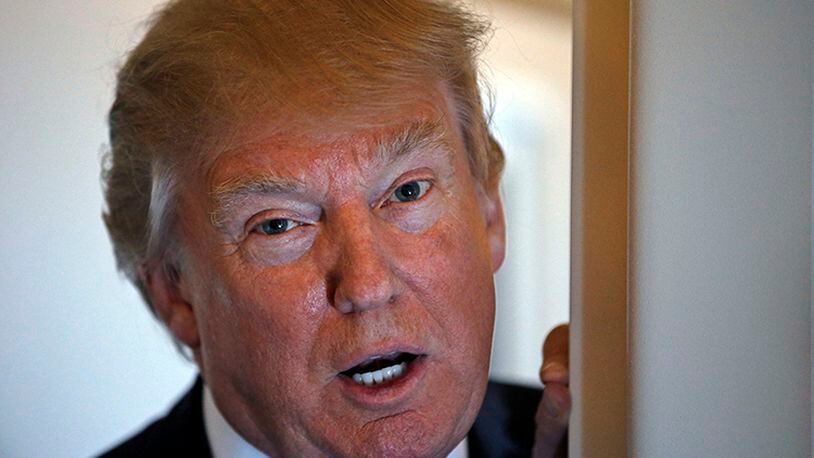1. Sell it
Lawmakers found themselves on defense over a replacement for the 2010 law, and President Donald Trump did not organize rallies specifically in support of the House Republican leadership measure.
For a tax overhaul to succeed, the president needs to take his pitch on the road to rile up his base, lobbyists advise.
"Trump likes to go out and have his rallies, and those are excellent ways to market what you're working on," said Mary Baker, a former IRS and Senate Finance staffer, who is now a lobbyist with K&L Gates.
A major revenue raiser in the House GOP leadership's tax overhaul blueprint is a controversial border adjustability proposal that would impose a 20 percent levy on imports. Border adjustments — taxing imports but exempting exports — would raise $1.2 trillion over a decade, helping to finance cuts to corporate and individual tax rates.
The Trump administration, so far, has sent mixed signals about whether it will embrace the idea. If the Trump team gets on board, tax lobbyists say, the president could champion it with his populist, America-first rhetoric. Yes, the proposal could result in higher prices for consumers when purchasing imported goods, but it would create more incentive for companies to manufacture in the United States, Trump could argue.
2. Consult the Freedom Caucus
Speaker Paul D. Ryan of Wisconsin and Ways and Means Chairman Kevin Brady of Texas ought to bring along the sometimes unruly faction of their party, the House Freedom Caucus, which helped derail the health care bill. The group of conservatives had been talking to Trump officials before the recess with the goal of reaching a health care deal.
"To state the obvious, they need to make sure that the Freedom Caucus guys are involved in the process early on and not putting provisions in that create ideological landmines," said Ken Kies, a longtime tax lobbyist at the Federal Policy Group. "I think Ryan and Brady have been doing that."
Kies, a former chief of staff at the Joint Committee on Taxation, said health care is more "ideologically explosive" than tax policy, on which most Republicans generally agree.
"Tax reform doesn't rise to that level of intensity," he added.
Adam Brandon, who runs the conservative organization FreedomWorks, agreed that congressional Republicans have had an open door when it comes to tax overhaul discussions.
"Unlike health care, Kevin Brady invited FreedomWorks' members to sit down in December," Brandon said.
Leaders also should include more discussions with rank-and-file Republicans, lobbyists suggested.
3. Bring in the outsiders
It's a self-serving suggestion for lobbyists, of course, but it also makes sense for lawmakers and administration officials to collaborate from the get-go with business and other interest groups.
"In general, they need to get more people involved earlier in the process," said Jamie Gregory, deputy chief lobbyist at the National Association of Realtors.
Not only did conservative ideological groups organize against the health care bill, but so did major industry lobbies such as doctor, hospital and senior groups.
No matter, there will undoubtedly be serious opposition from particular sectors that stand to lose tax write-offs and incentives, but bringing them in early may help minimize their campaigns against the measure. And if groups understand the overall possibilities of a comprehensive tax overhaul, they also may be willing to stomach otherwise unpalatable provisions.
Brandon, for one, said he's no fan of the border adjustability proposal but if the underlying legislation simplifies the tax code and offers a fundamental overhaul, then, "I could sing the praises of this bill all day."
4. Timing is everything
Putting health care on a fast-track timeline gave it a sense of urgency, but it also left little time for lawmakers to resolve their differences. Lobbyists say that creating artificial deadlines to accomplish such a major measure could ultimately hurt a tax bill's chances. Ryan has said he'd like to get a tax overhaul done by August.
"Tax reform is a complicated process," Baker said. "It takes time to talk about the policies, vet the policies and to draft them and get stakeholder feedback."
5. Are the '80s calling?
Recent pop culture, such as Netflix's "Stranger Things," may celebrate icons of the 1980s, but don't be confused: This tax overhaul doesn't have to follow the script of the last major one — in 1986.
Still, the health care debacle showed it may be worth reviving one signature of the Reagan-era tax rewrite: more public hearings on the minutiae of the measure.
"They had weeks and weeks of hearings," recalled Rachelle Bernstein, a tax lobbyist for the National Retail Federation, who worked on the overhaul in the 1980s while at the U.S. Chamber of Commerce. "The hearings went all day, and anybody that wanted to testify could come in."
Fleshing out some of the most controversial topics might help spur along the overhaul this time.
Members of Congress who are not on the relevant committees complained they weren't sufficiently involved in the heath care law redo effort. More hearings would give additional lawmakers a chance to air their concerns.
The health care bill garnered no Democratic support, unlike the 1986 tax overhaul. However, Democrats controlled the House in the 1980s, so bipartisanship was a must. It isn't this time.
"I don't feel like we're going down the same avenue," Bernstein said. "I think there's a very good chance we do tax reform, but it's very different on so many levels."
About the Author
